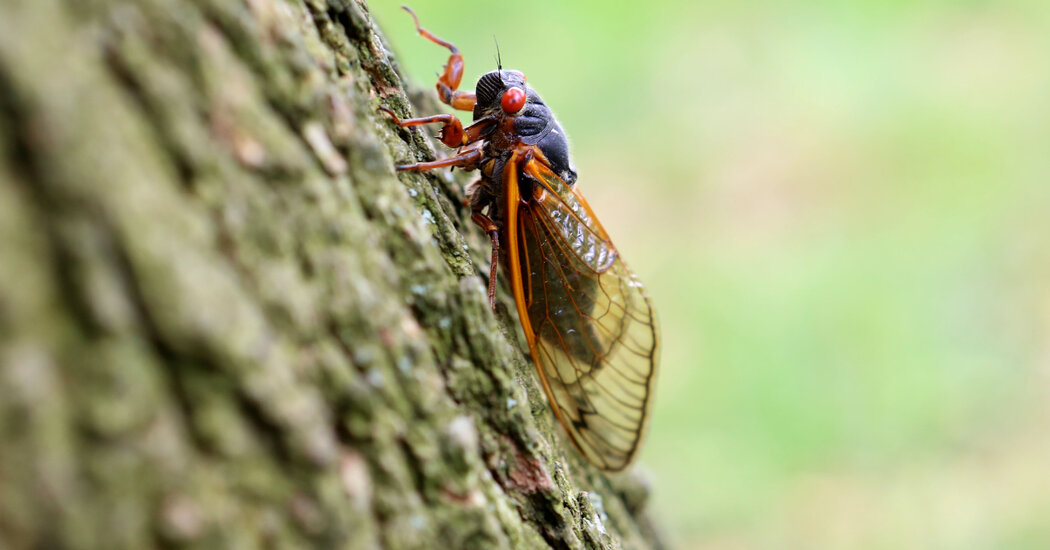Brood XIX and Brood XIII will both emerge this spring. The last time these bugs showed up at the same time in the United States, Thomas Jefferson was president.
The cicadas are coming — and if you’re in the Midwest or the Southeast, they will be more plentiful than ever. Or at least since the Louisiana Purchase.
This spring, for the first time since 1803, two cicada groups known as Brood XIX, or the Great Southern Brood, and Brood XIII, or the Northern Illinois Brood, are set to appear at the same time, in what is known as a dual emergence.
The last time the Northern Illinois Brood’s 17-year cycle aligned with the Great Southern Brood’s 13-year period, Thomas Jefferson was president. After this spring, it’ll be another 221 years before the broods, which are geographically adjacent, appear together again.
“Nobody alive today will see it happen again,” said Floyd W. Shockley, an entomologist and collections manager at the Smithsonian National Museum of Natural History. “That’s really rather humbling.”
So cool that bugs and trees like prime numbers
It is cool as hell, and for anyone who’s going “huh?”, I’m going to get this half wrong, but it has to do with making sure they don’t fall into “rythem” with their predators cycles. The odds of synchronizing to a prime are lower (because years are integers and a prime can only be in sync with itself or larger, not smaller).
Trees will have mast years on primes where they’ll produce just a crazy amount of acorns. Because they haven’t in so long, the squirrel population etc didn’t explode. So they’ll feast that year but can’t get to them all, and while the population of squirrels might grow that year, next year is a low acorn year again.
Is this why the pon farr is every 7 years
I just want to say I needed a laugh this morning and you delivered lmfao. Thanks stranger.
Last year winter my acorn problem was insane! Not so bad this winter
And ribs, don’t forget about prime ribs
I like prime ribs.
Something something fewer predators
Inspected numbers and choice numbers just aren’t as good.
1803? So the cicadas are a key part of the plan for expanding the power of the judiciary?!?!!!
I remember a huge cicada emergence when I was a kid in the 1980s. You couldn’t get a car out of the driveway without driving over dozens of them.
Same, I’m wondering how this will compare.
I still remember the crunching.
And the TASTE
People seriously do eat them. I’m not against eating bugs. I’ve eaten bugs before. I’d try them.
https://www.expressnews.com/food/article/Yes-you-can-eat-cicadas-how-to-cook-16385246.php
I love bugs. But only ocean bugs. With butter.
I wonder if you could capture a high quality, multitrack recording of this emergence event to get a multidimensional audio sample from unique times/geographies where these groups emerge.
With an audio sample that could only come from this specific event every 200+ years, you could set up a program that survives your own death and triggers only when it happens again.
I’m not sure what the utility would be, but I’d watch it on Netflix for sure.
Oh God the noise will be deafening. 😬
Mawp
What?
IT’S ALREADY HAPPENING. NOBODY CAN HEAR ME OVER THE CICADAS! 😱

Is this bad?
No, they’re harmless and they don’t even do much damage to plants because they mostly eat plant fluid in twigs, which trees and bushes usually survive just fine, even with a huge number of cicadas on them.
They’re just a big mess.
No, they don’t cause damage on their own. Birds get a windfall of big nutritious bugs. Humans might be a little creeped out.
Plus everywhere you go sounds like one of those old sci fi movies
I ate one once. 5/10, would be better deep fried.
Dehydrated and seasoned.
People do fry them. I posted a link elsewhere in the thread.
Now people will know what having tinnitus is like!
I genuinely love the cacophony of cicadas and I live in the Midwest so I’m thrilled for this!
Keanu Reeves remembers it like it was yesterday
Nic Cage too
I miss being able to make this joke about Dick Clark. 😢
spawn more overlords blerching regurgitation gurgling neighing sounds
Insufficient minerals
We require more Vespene gas
Emm, with the climate change and pollution, should we panic if they don’t show up?
The last major brood batch showed up a couple years ago. I think it’ll be fine.
It showed up but it was way smaller than it was 17 years prior.
‘the world’ then lists only places in USA.
You do it to yourselves…
this is actually pretty fascinating, i was under the impression that cicadas emerged periodically world wide, however while they do still spend years underground in other countries, emerging during favourable conditions, giving the impression of periodic emergence; the time period can vary from 1 to 9 years (sometimes longer), but isn’t strict like the USA 13 and 17 cycle. pretty cool.
What is the US if not a place in the world + that is watched?
when unique ecological events happen in any other place in the world, the title is often “x thing is seen in the world for the first time in x years” or some shit like that. honestly sometimes in media yeah, there’s an america-centric worldview being pushed; but sometimes you people get so overzealous about this “the USA is the whole world” schtick. this literally isn’t anything like that jeez. there’s cool unique bugs elsewhere in the world. there wouldnt be people fucking crucifying the title in the comments about those articles.
It’s a US News paper…
For some reason, I was thinking it was a few years more recent than 2011 the last time the Southern Brood emerged in my area. I have a memory of going for a hike in a wooded park, and there were so many of these cicadas that their individual calls just blended together into an almost ethereal low hum. Just didn’t realize it was that long ago.
Since childhood, I’ve always thought cicadas were really cool critters. Their calls are the quintessential soundtrack of summer days for me.
I don’t formally track things, but I do pay attention to when I first start noticing cicada calls each year. I had noticed that they have seemed to emerge later and later the past 4 or 5 years. In 2023, the first time I noticed any calls at all was near the end of June. Normally I start hearing them around the last week of May to the first week of June.
I also did not see as many cicada molts last year as normal, so I was thinking that it was a smaller emergence than typical. I wonder if it’s related to the upcoming 13-year brood getting ready to emerge?
Final note: I went most of my life without knowing that cicadas can “bite”. I mean, technically they can’t bite because their mouth parts are needle-like, but I found out that they will sometimes jab a human.
One year I had a Disney princess moment where a cicada landed on my finger while I was outside working in the yard. I just left it to do its thing, because again I think they’re cool and never had issues handling them before. Several minutes went by, and then I felt a poke in the general area of the cicada – and then realized it must have mistaken me for a tree and it was trying to feed. I could see it lifting up a bit and making repeated attempts to stab its mouth into my finger. I guess I was the most poplar Disney princess that cicada had encountered that day. Fortunately it wasn’t painful, but one of the jabs did break the skin and there was a small amount of blood.
And when the plagues come, the cicadas shall have a taste for human blood. We shall all have numberfour002 to thank for their hunger.
I prefer to believe that I’m uniquely nutritious and irresistibly sweet. And I probably acquired some kind of special powers from my cicada bite that enable me to make anything I touch suck.
What is the best weapon against this insurgence?
Ear plugs.
Yes, it’s important to wear protection when operating the Gatling turrets
Nukes probably.
BB or pellet guns are fun
I wonder if climate change will have dented their number. Large swaths of North America have been hit by unprecedented, multi-year droughts thanks to Climate Change. Trees under severe stress and unable to properly support sapsucking insects over multiple years may have killed off many cicada grubs.





















